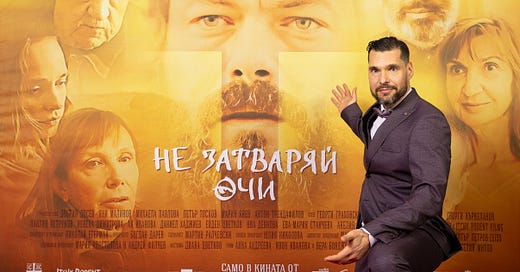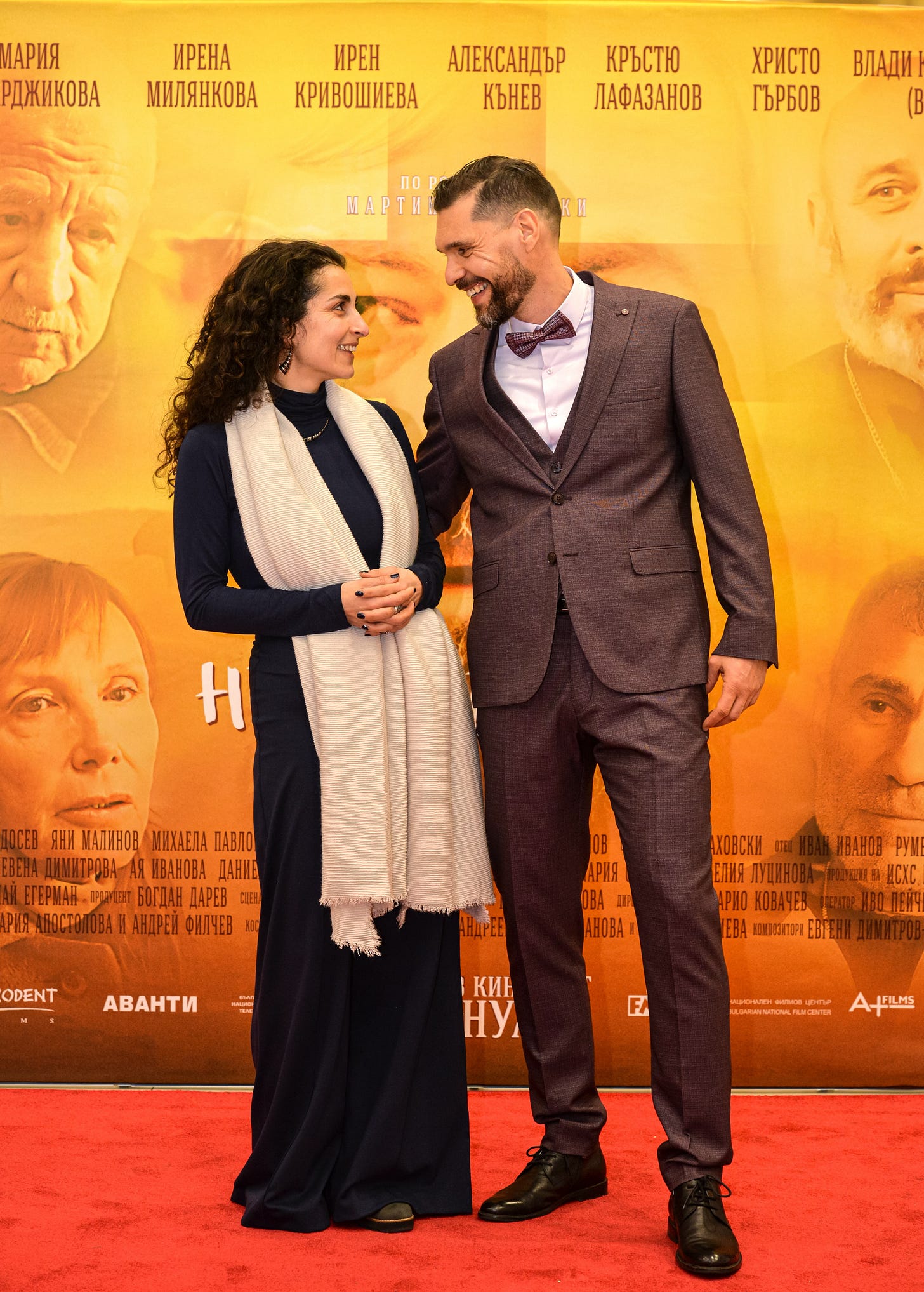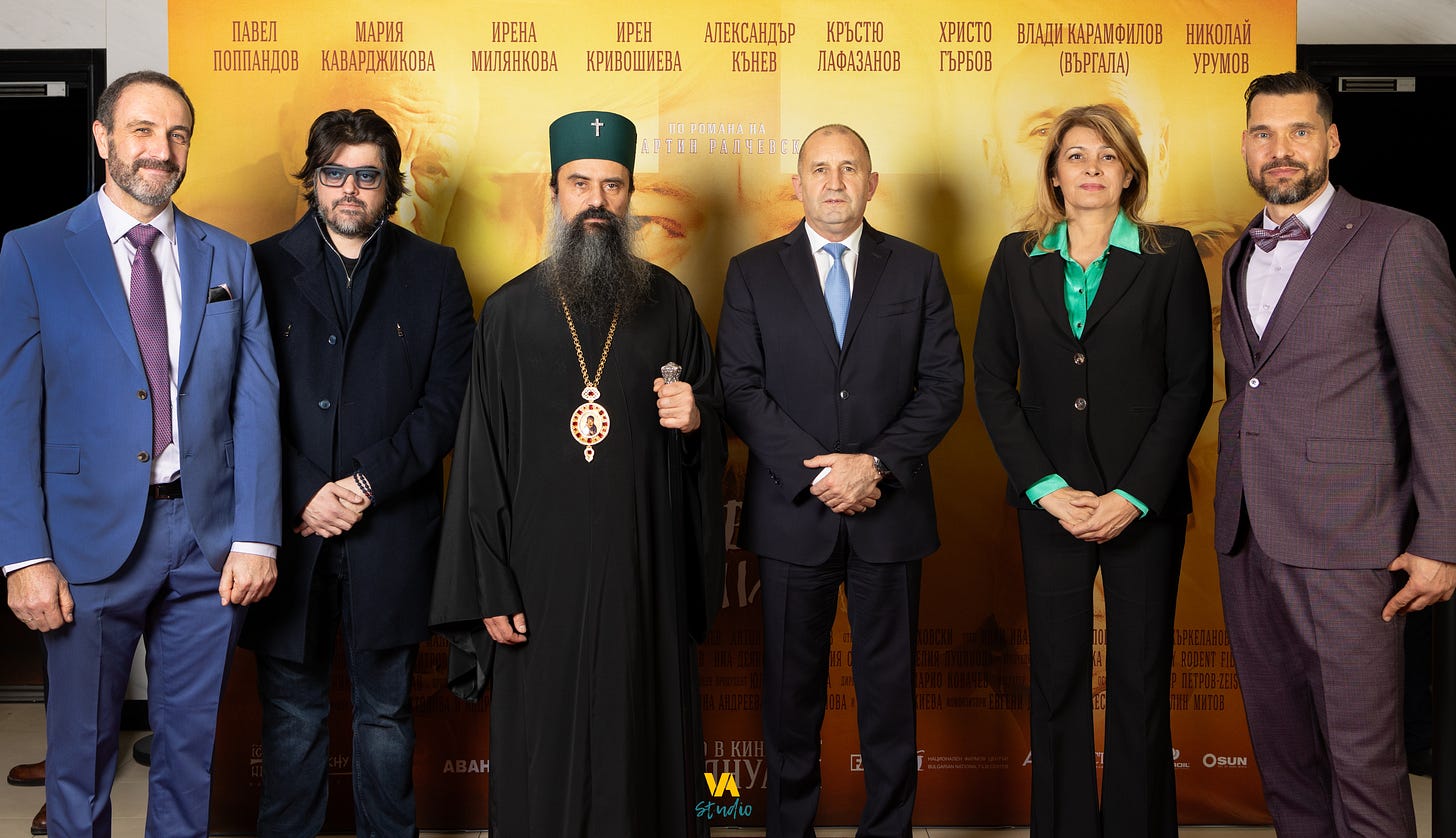At the train station, waiting on a platform. The train stops for me and a boy who drops his phone. Frightened, a flock of pigeons fly away. While the boy was looking down at his screen, everything was peaceful.
Grandmother pulls out a wet wipe. She gets up and starts cleaning the dust off granddaughter’s shoes. The child stands like a statue on a pedestal. Grandmother leaves to throw away the wipe; granddaughter takes her seat. Upon her return, grandmother lights a cigarette. I offer her my seat and she takes it. Through the cigarette smoke another train arrives.
“Are you going to Sofia? This one is for the Black Sea,” she says.
I wouldn’t mind making a quick trip to my beloved Black Sea, but not this time. I arrived in Bulgaria three weeks earlier on business. A few days before departing for Seattle, we held the gala premiere for “Don’t Close Your Eyes”.
The photo above features a few crew and cast members at the gala. A day that will go down as a major milestone in my film career - a day shaped by Divine providence, small miracles, and tireless effort. A culmination of dedicated, focused work and wonders, many wonders that live in the hearts and minds of everyone who devoted the last two years of their lives to this film. Thank you!
I remind myself never to close my eyes to the milestones in life, and to the people who help us achieve them. One of those people is my mother-in-law.
Two days before the gala premiere I find myself seating at a kitchen table in Plovdiv. (The second biggest city in Bulgaria, it is about two hours East from the capital.) My mother-in-law scrolls through Facebook while I have breakfast. She reads out loud: The text summarizes why Leonardo da Vinci is the son of an alien and a giant earthworm.
“Ts, ts, ts,” she shakes her head and adds, “Look at what they’re writing. Stupor has rotten their brains.”
At the 24-hour convenient store next door retirees eagerly await “Don’t Close Your Eyes”. They have learned about it from our biggest fan - my mother-in-law. Today, they’re discussing Bulgaria’s adoption of the euro. No one knows how it will benefit them - the elderly, those who built up Bulgaria, lev by lev. (Lev is the Bulgarian national currency.)
The euro came up in a conversation with a friend two days earlier, “Millions of Bulgarians work abroad and fuel our economy by sending money back home every month. What happens when the lev is devalued?”
I don’t have an answer. Maybe it will be catastrophic; maybe Bulgaria will face an economic, existential crisis; maybe people will stop choosing a better life abroad. But I’m not an economist - I make films. Meanwhile, the elderly woman next to me keeps talking:
“I deep cleaned the flat all day. I opened the windows to air it out. I lay down on the couch, to watch some TV. I glanced at the window sill. My eyes about fell out - it was as dirty as before.”
“There’s a car for every person, even for the children!” her friend chimes in. (Bulgarian cities don’t have the infrastructure to support so many cars on the road. Stonemasons built them under very different economic conditions, often in ancient times.)
“And we’re breathing it all in.”
“What happens to those cars once they don’t need them anymore?” asks another retiree with dyed blonde hair. She takes a sip from her coffee in a paper cup. I want to see the white in her hair. But she hides it...
Later, I get a haircut at a barbershop called “The Golden Monkey”. It is run by a young, hardworking man with two tattoos. One of them reads: It’s better to be hated for what you are than to be loved for what you are not.
I show him a picture of David Lynch.
“I’d like this haircut…in his honor.”
Lynch, a visionary film director, has just passed away. In matters of cinema, he was always himself. I don’t know if he had any tattoos.
As the barber shapes my beard, Eminem’s song plays in the background: If you had one shot, one opportunity… A legendary song from the time when I first came to America in ‘95. I think about our film’s theatrical release starting that Friday. This is my shot. Our shot. Our one opportunity.
After the barber congratulates me on the new haircut, I drink an espresso with warm milk and, then, buy a three piece suit. Bosilka helps me choose it. The store is Bulgarian and so is the brand, but the clothes are sewn in Turkey.
“The craftsmanship is better there,” says Bosilka. It didn’t used to be like that.
Bosilka fitted me last year as well when I hosted the Bulgarian Christmas concert in Seattle. I appreciate good service. I enjoy supporting industrious, smiling people and returning to their small business. Despite the inevitable influx of Western brands, small mom-and-pop shops still abound in the homeland.
Mehmed is also a vendor. He polishes shoes on Plovdiv’s Main Street. I hear the tapping of his brush. I glance at him, then follow his gaze to my shoes. I look down and feel ashamed. They are filthy. I don’t ask how much it will cost to polish them. Mehmed is a professional. He’s older, his face weathered but alive. I notice a fine silver watch on his wrist. I enjoy watching him polish with bravado. The Main Street is his stage.
“Step down. Step up. Again. The other. Down. Up. Alright. Done!”
“How much?”
“20 leva. They’re like new!” he nods in the direction of my brand new shoes.
I think to myself that for another 20, I could buy a new pair. I decide not to bargain.
I text Dobrin Dosev, an actor from “Don’t Close Your Eyes” and ask him what play to see while in Bulgaria. “Odyssey, without a doubt,” he texts back. I attended a performance. Brilliant! A mix of physical theater, video projection and good old theater craft. Odyssey’s wife was played by eight women on stage together, taking turns to speak, sometime in unison. The effect was stunning. I’ve filmed for the prestigious Seattle Opera before, yet I’ve never seen such a well-crafted production. Knowing the modest salaries of Bulgarian actors, the existence of this play is another small miracle. I get tickets for my wife to see it. Soon she will arrive from the States for the gala premiere.
I remind myself never to close my eyes to the woman who is my best friend and most valuable advisor - my wife. I’m grateful to share my love for cinema with Maria Apostolova, the brilliant production designer of the film.
The train arrives. The pigeons are gone. Grandmother and grandchild stand up and wobble off on their way to their own stories. The platform empties. I ride to the gala in Sofia.
The first-class bathroom is in terrible condition, but at least the windows in the train car open. In the U.S. modern trains are designed with permanently shut windows. A handicap for a creative like me who likes to breathe in life as much as to observe it. But I’m sure there is a reason for the design. Americans are pragmatic, everything has a reason - even the patterns of trees planted in a park, or along a street.
It is sunny. I step out of the train compartment, take a deep breath, slide down the window and gaze out dreamy. A forest. Snow melting. A train station in ruins. Dismantled factory. Half-built tunnel. A valley. Concrete. Railroad tracks. Forest again. Deciduous. I wonder where I am. As long as there’s a road meandering somewhere ahead, as long as I keep traveling, it doesn’t matter...
At Sofia’s Central Station a taxi driver wants 30 leva to take me on a ten minute drive to Eagle’s Bridge. But I’ve learned my lesson from Mehmed, the shoeshiner, so I smile and take the metro for two stops. Ticket price: 1.60 leva.
The next day, I find myself in a picture, in a story, in a film, in a life filled with grace and surprise. To my right in the picture bellow is the First Lady of Bulgaria - Desislava Radeva; next to her, our President, Rumen Radev; followed by the Patriarch of Bulgaria, Patriarch Daniil, with whom I had the honor of discussing the film; co-producer and director Nikolay Egerman; and screenwriter Martin Ralchevski.
How could I have imagined that my first feature film as a producer, shot in Bulgaria, would generate such interest!? The film is now screening in cinemas across 41 cities in my homeland and for three weeks it has been the most watched Bulgarian film. Only “Paddington in Peru” and now “Captain America” have had a bigger box office. It’s hard to describe what this moment means to me after three decades of living and working abroad. All the years rolling by like a train that never stops, for anyone, for anything, yet my love for my homeland only grows stronger.
I decide that one should never close their eyes to those who appreciate their art - regardless of political, ideological, or religious beliefs.
When I arrived from America in mid January, it was snowing. I took the metro from the airport to Eagle’s Bridge for five stops. Very convenient. Ticket price: 1.60 leva.
I stepped out of the underpass and found myself next to an ice ring. Monday; ten at night; loud music; flashing colorful lights; and people skating. Skating. Skating. And the snow kept falling, thick and endless. It was beautiful. I started walking down the sidewalk.
BAM!
A car crashed into a taxi, sending it spinning into the oncoming traffic. Nobody was hurt.
“Bulgaria - the land of extreme emotions,” I said under my breath. And I thought about my time ahead there, reminding myself not to idealize my stay.
Today, back in Seattle, I’m reminded to never close my eyes to be the best version of my creative self, here, now, and always.
Please join me in celebrating “Don’t Close Your Eyes” for its Seattle premiere on March 2nd. You can find out more information here.
If you live in Chicago you can see the film on Sunday, February 22nd here.
Next week we will announce showings in LA, Las Vegas, Spain, England, Germany, Netherlands and more.
Stay inspired, make it matter,
Bogdan






